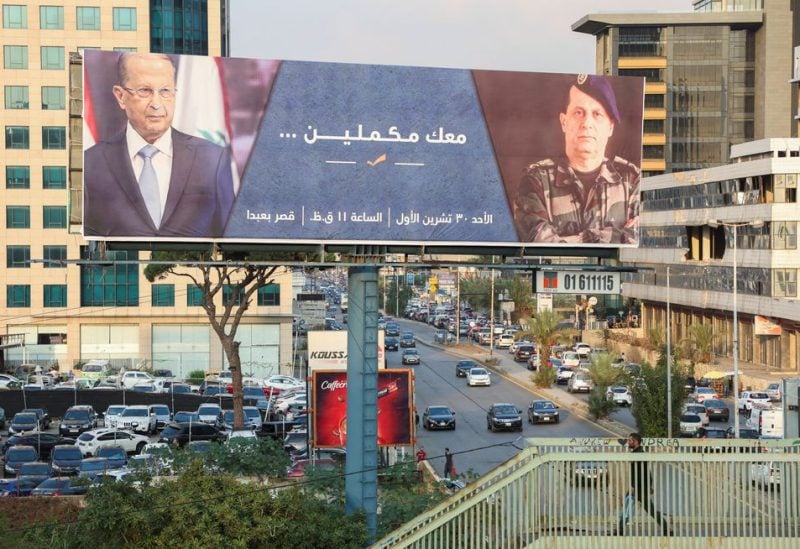
A billboard depicting Lebanon's President Michel Aoun, whose term is expected to end on October 31, is placed in Jdeideh, Lebanon October 27, 2022. REUTERS
A gap will be left at the top of the collapsing Lebanese state when Michel Aoun, the 89-year-old Christian president who presided over Lebanon’s catastrophic financial collapse and the horrific Beirut port blast, leaves the presidential palace on Sunday.
A replacement for the position, which has the authority to ratify laws, name new prime ministers, and approve government formations before they are put to a vote in parliament, has yet to be decided by Lebanon’s parliament.
Like during more than half of Aoun’s time in office, Lebanon is currently governed by a caretaker cabinet as the premier-designate has been trying for six months to form a government.
Aoun is a deeply divisive figure, adored by many Christians who viewed him as their defender in Lebanon’s sectarian system but accused by critics of enabling corruption and helping armed group Hezbollah gain influence.
Like during more than half of Aoun’s time in office, Lebanon is currently governed by a caretaker cabinet as the premier-designate has been trying for six months to form a government.
Aoun is a deeply divisive figure, adored by many Christians who viewed him as their defender in Lebanon’s sectarian system but accused by critics of enabling corruption and helping armed group Hezbollah gain influence.
For others, those modest successes pale in comparison to the 2019 financial meltdown, which has pushed more than 80% of the population into poverty and prompted the most widespread anti-government protests in recent history.
Aoun’s term was also inextricably linked to the 2020 blast at the Beirut port, which left more than 220 people dead.
Aoun later said he had known about the chemicals stored there and told Reuters in an interview on Saturday that his presidential powers were not wide enough to address the economic crisis.
“He was by far the worst president in Lebanon’s history” said Michel Meouchi, a lawyer and father. “I prefer a void in the presidency to him.”
Aoun, a farmer’s son from a suburb of Beirut, began his journey to the presidency while serving as the army’s commander and the head of one of the two opposing governments in Lebanon’s 1975–1990 civil war.
After spending 15 years in exile, he returned to Beirut once Syrian forces withdrew in response to international pressure in 2005, the year of the killing of former prime minister Rafik al-Hariri.
His Free Patriotic Movement joined up with Hezbollah in 2006, giving the armed group crucial Christian support. Aoun praised Hezbollah for playing a “useful” role in serving as a “deterrent” against any Israeli assault during the maritime border negotiations in his interview with Reuters.